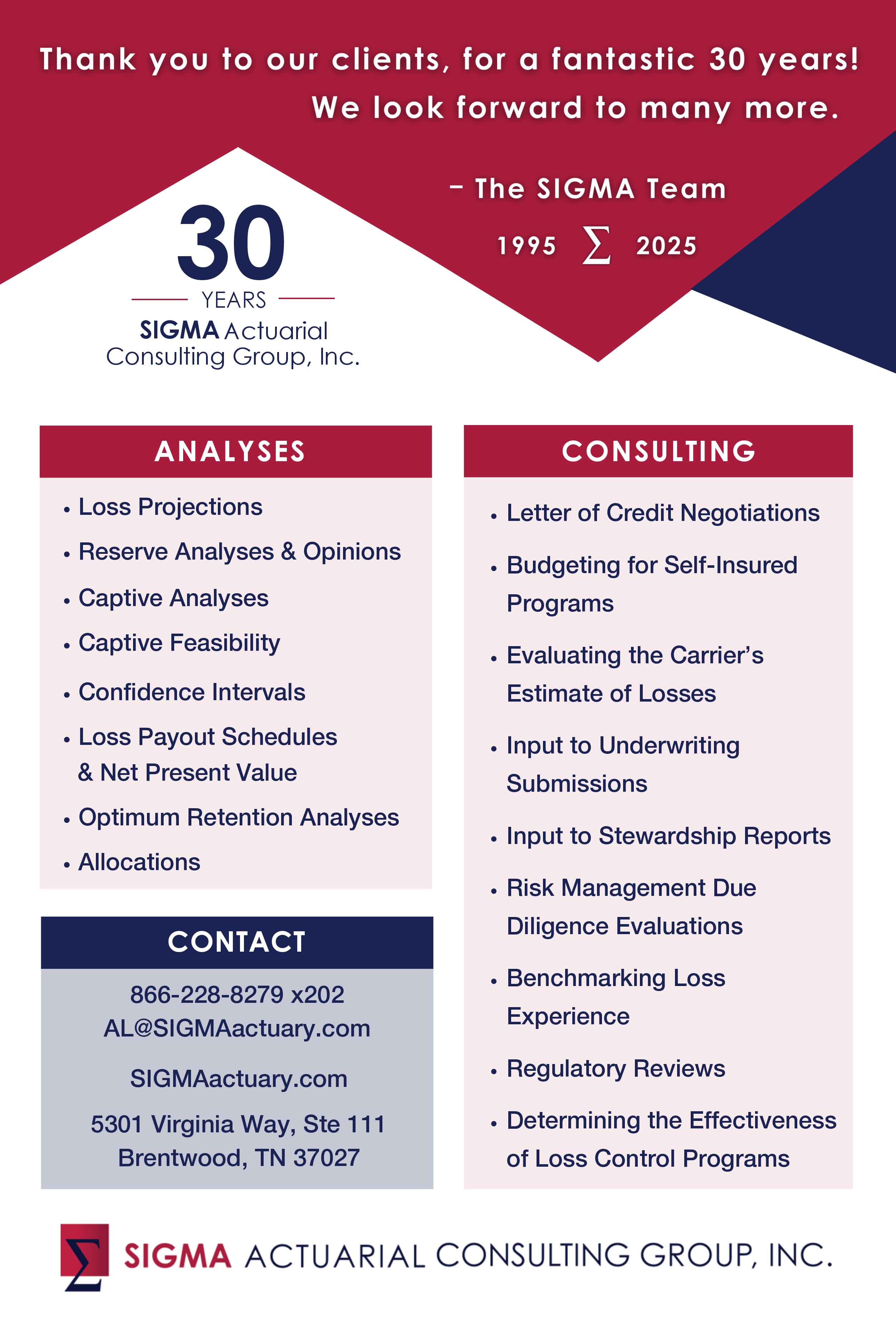As South Carolina continues to grow as a captive domicile, the benefits of its stable captive regime have come to bear. Challenges persist in the industry as a whole, however, continued growth will require reflection on how best to handle them
South Carolina is a formidable player in the captive insurance world.
Since the first captive legislation was passed in 2000, the domicile has steadily carved out a niche as a go-to destination for businesses seeking tailored risk management solutions, building a comprehensive infrastructure to support its burgeoning captive market.
The domicile’s robust regulatory framework, business friendly environment, and dedicated infrastructure, have greatly contributed to rapid growth in the captive insurance sector, as more businesses seek to use innovative solutions to manage risk and optimise insurance costs.
With over 200 active captive insurance companies, South Carolina continues to see interest in its captive insurance sector from businesses in a variety of industries, with a steady increase in the formation of new captive insurance companies as well as increased interest from small and mid-sized companies.
Significant interest in captive formations
With rising insurance costs, there has been an increased interest in self-insurance, according to Warren Miller, senior relationship manager at Performa and president of the South Carolina Captive Insurance Association (SCCIA). He adds that in South Carolina, there is continued interest in forming captives due to its reputation as one of the world’s premiere domiciles.
“Special purpose captives and cell structures have been most popular recently, and the largest coverage written in South Carolina captives continues to be property, along with plenty of medical professional liability,” Miller states.
Dawn Dinardo, managing director of Captive Management Operations at Hylant Global Captive Solutions and education chair at the SCCIA, remarks: “From a captive management and consulting perspective, we are seeing growth in the use of property, medical stop-loss, and still the traditional lines such as workers compensation, general liability and auto liability.”
Dinardo notes that the hard market “is still driving risk financing strategies in captives, increasing retention, and adding lines of coverage to existing captives”. In addition, Miller says South Carolina captive owners are continuing to look for “new and innovative ways to utilise their captives, which is leading to growth amongst existing captives in addition to new formations”.
Opportunities for captive companies
South Carolina offers a wealth of opportunities for captive insurance companies, in large part driven by its favourable regulatory environment, strategic location, and supportive infrastructure. Miller says that the state takes a “business friendly” approach to captive insurance regulation, offering significant opportunities for new and existing captive owners.
“If a company has a creative idea on how they can take more control of their risk management process by retaining and financing their own risk through a captive, South Carolina is the place for them,” he says.
Miller adds: “The robust regulatory environment paired with the highly skilled captive service provider community that exists within South Carolina, uniquely positions us to help captive owners solve insurance and risk management problems through self-insurance.”
South Carolina’s regulatory framework is particularly conducive to the success of captive insurance companies. With a dedicated captive division within its Department of Insurance, the state is able to focus specifically on the regulation and support of captive insurance companies, as well as providing specialised expertise and assistance. The regulators in this division have knowledge and experience of the industry’s nuances, allowing for a more informed and collaborative regulatory approach than in some other domiciles.
The state offers flexibility, accommodating various types of captives, including pure captives, group captives, and protected cell companies, and has a streamlined approval process for captive formations and ongoing operations. This allows businesses to choose the best structure to fit their needs, and allows them to quickly set up and manage their captives with ease. Furthermore, South Carolina’s regulatory environment is stable and predictable, allowing businesses to rely on clear and consistent regulations while reducing uncertainty. The competitive premium tax rates in the state also make it cost-effective for companies to domicile their captives in the jurisdiction.
However, opportunities bring challenges, and captives domiciled in South Carolina are not immune to the wider hurdles facing the industry. Dinardo notes, for example, that property coverage is still a significant challenge facing the captive industry. Property insurance can often involve high-severity losses, such as those resulting from natural disasters, which lead to substantial financial claims, making it difficult for captives to manage and absorb the loss without impacting their financial stability.
Additionally, looking at some of the wider challenges, the captive insurance industry continues to face a talent shortage, which Dinardo says should be a focus for South Carolina and the captive sector as a whole. Dinardo explains that Hylant is dedicating itself to recruiting younger talent, offering internships, and hiring recent college graduates from “all degree types” to assist in consulting and managing captives. And while this continues to be one of the industry’s greatest challenges, Dinardo says that the industry is “starting to truly mentor and promote the young talent for succession planning”.
According to the managing director, Hylant’s internship programme serves as an example of this mentorship and is the “driving force behind recruitment for full-time employees. We believe early-career graduates are the future of the insurance and brokerage industries, and they have a long-term career trajectory with Hylant”, she remarks.
The firm regularly recruits and hires captive management and consulting interns, “building and implementing a programme dedicated to early career professionals and college graduates,” she says, “to give them a foundation in insurance and exposure to different career opportunities as their first stepping stone out of college”.
She further explains: “Even for those with non-traditional backgrounds, they have the opportunity to apply and be considered for full-time opportunities within the business where they will be educated and learn rapidly about the industry. We appreciate and value our interns and beginning career employees.”
Future outlook for captive
South Carolina’s dedicated, business-friendly approach, and its robust regulatory framework have led to increased growth in recent years. Miller notes that South Carolina licensed 23 new captives last year, and will license seven more in 2024.
“To ensure long-term stability, we continue to prioritise quality over quantity when considering growth in our domicile, and we are thrilled with the types of companies that have recently chosen to domicile in South Carolina.”
Miller explains: “We maintain a healthy mix of all types of captives that the South Carolina statute allows for, including single parent, association captives, industrial insured captives, and risk retention groups.”
If a captive owner wants a more unique structure, Miller highlights that the state’s special-purpose captive licence is a great tool to accommodate those situations, which does seem to be happening more often.
The special-purpose captive licence allows businesses to create tailored solutions for specific and complex risk scenarios that traditional insurance markets may not be able to address. Businesses with specialised risk profiles can use these licences for various purposes such as securitisations, reinsurance of unusual risks, and alternative risk financing mechanisms. These licences are able to accommodate a wide range of business plans and structures under the state’s regulatory framework, allowing companies to implement unconventional and novel risk management strategies.
Through 2024, South Carolina will continue to develop itself as a captive domicile, and Miller notes that the state’s plan this year is to continue building its reputation as one of the world’s top domiciles “by attracting high-quality companies that focus on risk management and safety to form their captives in South Carolina”.
Speaking on behalf of the SCCIA, he says: “As an association, we also plan to support the Department of Insurance in any way that we can as they continue to build their team of world-class captive regulators.”
Finally, echoing Dinardo’s comments on talent, Miller emphasises the “importance of attracting talent to the captive industry in South Carolina to ensure that we maintain our status as a top-tier domicile.”





